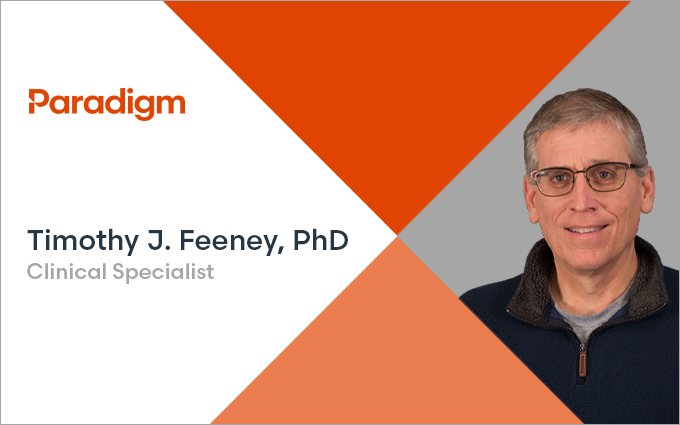06/30/2021

Paradigm’s ongoing commitment to the biopsychosocial health of catastrophically injured workers requires a focus on psychological as well as physiological healing that helps people resume productive, meaningful, and satisfying lives. It’s an approach built to successfully integrate psychological and behavioral care with physical and functional recovery. The Paradigm Outcome Plan is carefully designed to provide this balance for injured workers and their families, creating a space to heal and adapt to what are very often lifelong changes.
Supporting the work of our network managers and medical directors, Paradigm Clinical Specialists help guide treatment from focused areas of expertise. For workers with serious acquired brain injuries (ABIs), the support needed to regain a higher level of function in their home and community requires specialists with deep knowledge and experience.
To meet this need, Paradigm is proud to welcome Timothy J. Feeney, PhD, to our team of clinical specialists. Dr. Feeney is a behavioral psychologist with a long and meaningful career spanning brain injury rehabilitation, special education, and directing grant-funded projects—and has authored numerous scholarly articles.
Dr. Feeney recently shared his background, his approach to neurobehavioral care, and his excitement for helping the injured workers Paradigm serves to develop long-term, sustainable support systems. In his view, whole-person care lies at the heart of returning brain injury survivors to their families, communities, and productive lives.
Continuing a family business
For Dr. Feeney, behavioral health and special education have always been an integral part of his life. “Psychology and behavioral care were always a family business to me. My father ran an institution dedicated to the education of children with developmental disorders, what we would classify today as children on the autism spectrum,” he explains. “After school, I would spend time working with these students and helping them learn. From the time I was five, I was immersed in supporting people with behavioral needs.”
This early exposure to helping people overcome behavioral obstacles in an effort to help them live full lives in their community led Dr. Feeney to study psychology. “I was trained as a behaviorist and completed my Psychology degrees studying under some of the leaders in this branch of the field,” he says. “I started my career working as a state psychologist and I’m also proud to have administered grant work for people with severe behavioral disabilities and disorders in the community. Eventually, I became the project director for the New York Neurobehavioral Resource Project, where I served for about 20 years.”
No matter what capacity he works in, from research to direct clinical support to consulting, Dr. Feeney has remained committed to the ability of behavioral care to change people for the better and help them integrate, or reintegrate, into a stable environment.
Positive behavioral interventions for improved ABI outcomes
A fundamental concept of contemporary behavioral psychology is that altering behavior patterns can be a highly effective form of treatment, especially for specific groups of patients such as those with an ABI. A particular method of applied behavior analysis that Dr. Feeney practices in many cases is known as positive behavior support. “The idea is to focus on supports that help create an environment where positive behaviors can develop and are less likely to reverse over a long period of time.”
Patients who develop an ABI due to a catastrophic workplace injury often have a hard time regulating their behavior, which creates difficulties for adjusting to life at home and returning to work. “When these patients leave an inpatient specialized treatment program, we then need to think about how we plan for their entire life,” says Dr. Feeney. “Very often, for a person who has had brain trauma, there are periodic social and psychological issues that stay with them for the rest of their life. Teaching patients and families how to deal with stressors through practical supports that create a positive environment helps them navigate these rough patches when they do occur.”
A shared commitment to comprehensive, whole-person care
As a longtime colleague of Dr. Deborah Benson, Paradigm Associate Vice President of Clinical Solutions, Dr. Feeney first became aware of Paradigm after working with the organization as a provider. “I’ve actually done some work with Paradigm on the provider side and always loved their people-focused approach,” he explains. “It’s an approach that allows for individualized treatment within the bounds of evidence-based practice, which is so important for these cases,”
According to Dr. Feeny, true care management that helps people overcome behavioral difficulties on a long-term basis requires a comprehensive approach. “I was frankly surprised at how far Paradigm was willing to go to achieve a genuinely positive outcome for their patients. It’s not something I have encountered very often in my career.”
As a new Paradigm Clinical Specialist, Dr. Feeney is thrilled to put his expertise and experience to work, helping the Paradigm team develop strategies that help even more injured workers find the positive support required to return to their homes and jobs. So far, he’s been particularly impressed with the commitment to in-depth, cross-functional training. “The level of training support [at Paradigm] is just another indicator that there is this incredibly comprehensive system designed to drive a high level of service,” he explains. “From the way team members are trained to log notes, to the systems in place to create a care plan, it really demonstrates the core values that drive everyone here.”
Learn more about Paradigm’s commitment to an outcome-focused and biopsychosocial approach when treating catastrophic injuries.